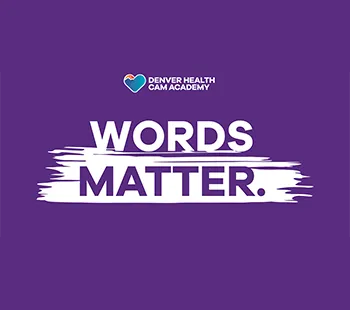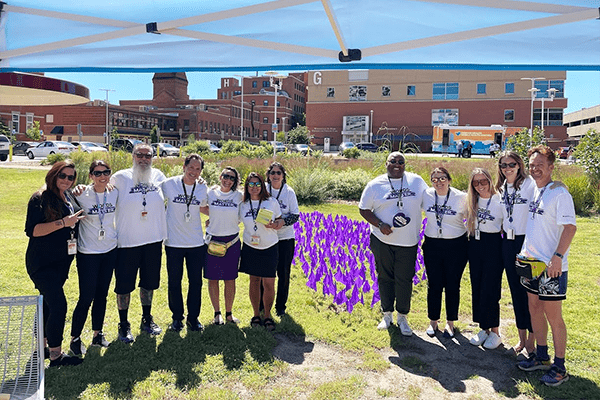May 15, 2024

Words matter. They do.
The words that we use have a direct relationship to the outcomes of any conversation and are particularly important within a healthcare system. Patients often face a variety of barriers when it comes to accessing integral services without the added burden of stigmatizing language, regardless of intent. The Center for Addiction Medicine (CAM) launched its “Words Matter” campaign in April, aiming to educate healthcare workers within the Denver Health system on person-first language to reduce stigma and increase empathy with patients experiencing substance use disorders (SUD). After a successful launch of educating 727 Denver Health employees and gaining the commitment to use person-first language from 511 individuals, CAM is ready to expand its efforts to the greater community.
As outlined in the Words Matter Language Guide, “the “Words Matter” campaign came to fruition following a thorough data analysis that highlighted the presence of stigmatizing language in Denver Health’s patient notes and interactions”. Utilizing a technology called “Natural Language Processing” to review patient records, a significant presence of stigmatizing language was discovered specifically with patients experiencing substance use disorders. In conjunction with the CAM’s Community Advisory Meeting, which takes direct feedback from the community, it was determined that stigmatizing language causes patients to become resistant to care and reduces engagement with their treatment plan. Stigmatizing language refers to the use of words or phrases that devalue and label individuals based on their SUD, focusing only on their condition and overlooking their experience and personhood. Stigmatizing language can also dissuade individuals from seeking care or trigger a recurrence of substance use.
CAM is spearheading a culture shift that aims to foster a culture of understanding, empathy, and support via language transformation. Their pledge to change the language used around individuals experiencing SUD will allow further advancements in inclusive and compassionate care.
What is person-first language?
The “Words Matter” campaign focuses on using person-first language and reducing stigma during in-person visits and post-visit notes by recognizing that patients are people first, with their medical conditions being a secondary aspect of their identity. By centering person-first language, healthcare professionals reduce overall stigma and barriers to care for individuals with substance use disorders and increase the likelihood of patients completing their treatment as they feel someone authentically cares about them. Person-first language allows patients to be more engaged with care, experience increased empathy, and allows for an overall better health delivery system for patients moving into recovery.
Examples of person-first language:
- Person with Substance Use Disorder
- Person with Alcohol Use Disorder
- Person who uses drugs
- Person in recovery/remission
- Person experiencing homelessness
Our Commitment:
The Public Health Institute at Denver Health is dedicated to the “Words Matter” culture change movement and are directly involved in the planning and execution of this campaign. We promise to integrate person-first language in all of our programs to create a more inclusive environment for our community and patients. In conjunction with the CAM Team: Brooke Bender, Administrative Director, John Mills, Public Health Planner, Emily Elrick, Workforce Development Specialist, and Tyler Espinosa Support Assistant, PHIDH supports CAM’s efforts directly via Judy Shlay as the Medical Director, Denver Prevention Training Center supporting educational efforts in CAM Academy, and the Community Advisory Meetings led by Sarah Belstock.
Center for Addiction Medicine team - Overdose Awareness Day 2023
Take the “Words Matter” Pledge
As part of our commitment to driving change within Denver Health, we invite you to join the “Words Matter” pledge. By taking this pledge, you:
- Understand the significance of the language you use when discussing substance use both in documentation and interactions.
- Believe that using clinically accurate and person-first language is essential in reducing stigma and improving care.
- Pledge to use language that acknowledges substance use disorder as a treatable medical condition, from which people can and do recover, rather than viewing it as a moral failing.
As healthcare personnel, we have the power to catalyze change by moving away from terminology that negatively impacts care. However, this work goes beyond healthcare workers. As community members, your pledge to change the language we use when speaking to and about people who experience SUDs helps to remove the stigma surrounding their medical needs and can encourage more people to seek support and treatment. Language may change over time as we better understand substance use disorder. Let’s continually re-evaluate the words we use and professionally model clinically accurate, person-first language to stop the stigma of substance use disorder.
Additional Resources:
Please take the time to read through the Words Matter Language Guide, where you can find guidance with the “Use This… Instead of This… Because” table, which offers alternatives to stigmatizing terms and suggests terminology that fosters a more supportive and empathetic environment for individuals with SUD.
If you are interested in attending a future Words Matter workshop or any of the other workshops provided by the CAM Academy, you can view and register for their course offerings via the Center for Addiction Medicine (CAM) Academy - Denver Prevention Training Center (denverptc.org).
Questions?
If you have any follow-up questions or would like to bring Words Matter training to a local group or organization, please reach out to CAMAcademy@dhha.org.


